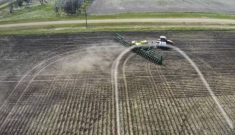you’ll only be good enough to milk cows on my family’s farm,” a fellow student once jeered at Mathieu Barbeau.
“In a few years,” came Barbeau’s answer, “I’ll be big enough to buy you out.”
Barbeau, now 28, figured the odds were against him. Everyone else figured it too. He’d heard it hundreds of times from his first day in ag school. Even if your parents farm, it’s far from a sure thing that you’ll be able to farm yourself.
Read Also

How scientists are using DNA and climate data to breed crops of the future
A method for forecasting how crops will perform in different environments so that plant breeders can quickly select the best parents for new, climate-resilient varieties.
If your parents don’t farm, don’t even think about it.
Barbeau wasn’t born on a farm. His father was a machinist in a steel shop. Yet during his teenage summers, Barbeau worked on an uncle’s dairy farm at La Présentation, near Saint-Hyacinthe, Quebec, and he liked it so much he decided then and there that he would one day become a dairy farmer himself.
No one and nothing would stand in the way, Barbeau decided.
What he didn’t know then, though, was that the parents who were giving a hand up to his farming classmates were also getting ready to give a hand up to him and to others like him, so they could have a realistic shot at becoming farmers too.
Barbeau meanwhile applied for agriculture college at Saint-Hyacinthe and began his study of dairy farming, complete with on-farm internships. If he was going to have any chance of
Across Canada
New entrant programs were pioneered by Dairy Farmers of Manitoba. Quota loans to help start up new dairy operations also exist in New Brunswick, Nova Scotia, Prince Edward Island and Quebec. Starting August 1st, Ontario will also have its ow program for P5 pool quota harmonization.
“There has been tremendous interest, but the question is: how many will follow through and file an application?” asks Dairy Farmers of Ontario (DFO) director David Murray.
DFO will offer 10 quota loans of 12 kg. In Quebec and New Brunswick, almost all applicants obtain their quota loan the first time they apply. Applications must include a solid business plan and approved bank financing.
Murray expects several applications to come from Mennonite communities. He says the new entrant program could also attract individuals who weren’t raised on dairy farms, but work in related industries.
“We have to ensure young people come along to keep the industry alive and viable,” Murray says.
Quebec remains Canada’s hotspot for union help to young farmers entering supply management production. Last year, more than 1,000 kg of milk quota was loaned to graduating ag school students as they entered the business, most of them as coowners of existing family farms.
Quebec egg farmers now offer one free lifetime quota loan for 5,000 layers every year. This quota is only transferable to one’s children.
Chicken farmers give 50 m2 or 100 m2 of broiler quota to any new producer aged 18 to 40, provided the applicant also purchases 150 m2 or 300 m2 of quota.
success at dairy farming, he reasoned, he’d need to excel at production and herd management.
Even so, he knew his road would be a little longer, and perhaps a bit bumpier than for some of the other students. But, in a province with a strong ethic of farm action, Barbeau believed there was hope.
In 1985, the Fédération des producteurs laitiers du Québec (FPLQ — Quebec’s dairy marketing board) launched a quota loan program for young farmers. Anyone completing a college education in dairy production and joining or starting a farm was eligible for the loan of five kilograms of milk quota free, to be paid off gradually after five years. (A kilogram of quota is roughly the amount of quota needed for a single milking cow for a year and is worth approximately $25,000.)
The loan comes from the FPLQ’s own quota reserve, points out FPLQ spokesperson Francois Dumontier. Last year, 206 young farmers qualified. Barbeau was one of them.
In 2006, the FPLQ also created a new entrant program specifically for farmers starting an entirely new operation. Every year, 10 new dairy farmers obtain 10 kg of quota to be used for free for five years. It’s called the P5 quota policy, and when the harmonization process is completed in August, the program will be upgraded to 12 new entrants, each one getting a 12-kg quota loan. (See sidebar.)
“It may not sound like a huge number, but bringing 10 completely new farmers into dairy production every year will have an impact,” Dumontier says.
The board believes the number is about equal to the number of non-farmers who want to get into dairying and are ready to make the commitment that it takes. “There aren’t hundreds of city people who are lining up,” Dumontier says.
So far, the program has been a success not just for the board, but for the new farmers too. None have backed out after getting started. “The advantage with a quota system is that you know you will be able to sell your production, and you will be able to sell it at a realistic price,” Dumontier says. This, he says, makes it easier up front to create a business plan that you can stick to, and it also makes it easier to negotiate with bankers.
At school, Barbeau focused on figuring out innovative exit strategies for farmers that have no children to transfer their farms to, such as transfering to an employee.
He even took the idea on as a school project. In order to put his business ideas to the test, Barbeau made it known that he was looking for a farm whose owners were about to retire. Then he was contacted by a husband and wife team in Lachute who were looking for an employee who might eventually be interested in taking over their dairy farm.
Barbeau worked on the Lachute farm for three years, finetuning the details of his business plan.
Then the BSE crisis came along, his employers got cold feet, and announced one day they had changed their mind about transferring the farm to him.
Barbeau’s dream was shattered. He just couldn’t stay another day on the farm. “It was really tough,” Barbeau says. “Had I stayed, I would have gone into a depression.”
But another door opened. Barbeau
soon found a new position near Saint-Hyacinthe on a farm where he had done one of his internships. Dairy farmer Alain Desautels, 37, rented him a house and gave him full responsibility over his 40 Holsteins.
Barbeau knew he wouldn’t last long as an employee, no matter how much trust and appreciation he had from his employer. He soon had an idea. The farm had an old empty barn where his employer’s heifers used to be raised. There, Barbeau would start his own dairy production.
Desautels’ response was a flat no.
But Barbeau didn’t quit. Instead, he kept up his work intensity, and also kept up the dialogue, bringing in plenty of outside advice.
“My boss realized that without this project, there was nothing to keep me working in agriculture,” Barbeau says.
Mutual self-interest eventually won the day. Barbeau got a chance to milk his own herd, and Desautels got insurance he’d have a motivated, skilled employee on the farm for another 15 years.
The barn was entirely renovated, from the roof to the concrete, at Desautels’ expense. Rent was calculated to match the exact cost of the loan used for renovations.
Barbeau bought all the milking equipment, 15 Jerseys and 8.4 kg of quota, and qualified for a five-kg quota loan from the FPLQ. Production started in August 2008.
A 15-page contract was drafted which Barbeau and Desautels tried to make as comprehensive as possible, covering everything from the hourly rate for the use of tractors to an increased rental rate for the barn should Barbeau quit milking Desautels’ cows.
Desautels and Barbeau even agreed that three years before the expiration of the 15-year contract, they will being talks on what will come after.
Everything is possible, Barbeau says. Desautels’ children might be interested in the farm. Or Barbeau could begin purchasing the farm. Or he might have enough equity to buy a whole other farm.
Small adjustments are always needed, but good communication ensures everything runs smoothly. For now, the fit is perfect, Barbeau says. “It’s been almost a year, and it’s been wonderful.” CG
soon found a new position near Saint-Hyacinthe on a farm where he had done one of his internships. Dairy farmer Alain Desautels, 37, rented him a house and gave him full responsibility over his 40 Holsteins.
Barbeau knew he wouldn’t last long as an employee, no matter how much trust and appreciation he had from his employer. He soon had an idea. The farm had an old empty barn where his employer’s heifers used to be raised. There, Barbeau would start his own dairy production.
Desautels’ response was a flat no.
But Barbeau didn’t quit. Instead, he kept up his work intensity, and also kept up the dialogue, bringing in plenty of outside advice.
“My boss realized that without this project, there was nothing to keep me working in agriculture,” Barbeau says.
Mutual self-interest eventually won the day. Barbeau got a chance to milk his own herd, and Desautels got insurance he’d have a motivated, skilled employee on the farm for another 15 years.
The barn was entirely renovated, from the roof to the concrete, at Desautels’ expense. Rent was calculated to match the exact cost of the loan used for renovations.
Barbeau bought all the milking equipment, 15 Jerseys and 8.4 kg of quota, and qualified for a five-kg quota loan from the FPLQ. Production started in August 2008.
A 15-page contract was drafted which Barbeau and Desautels tried to make as comprehensive as possible, covering everything from the hourly rate for the use of tractors to an increased rental rate for the barn should Barbeau quit milking Desautels’ cows.
Desautels and Barbeau even agreed that three years before the expiration of the 15-year contract, they will being talks on what will come after.
Everything is possible, Barbeau says. Desautels’ children might be interested in the farm. Or Barbeau could begin purchasing the farm. Or he might have enough equity to buy a whole other farm.
Small adjustments are always needed, but good communication ensures everything runs smoothly. For now, the fit is perfect, Barbeau says. “It’s been almost a year, and it’s been wonderful.” CG














